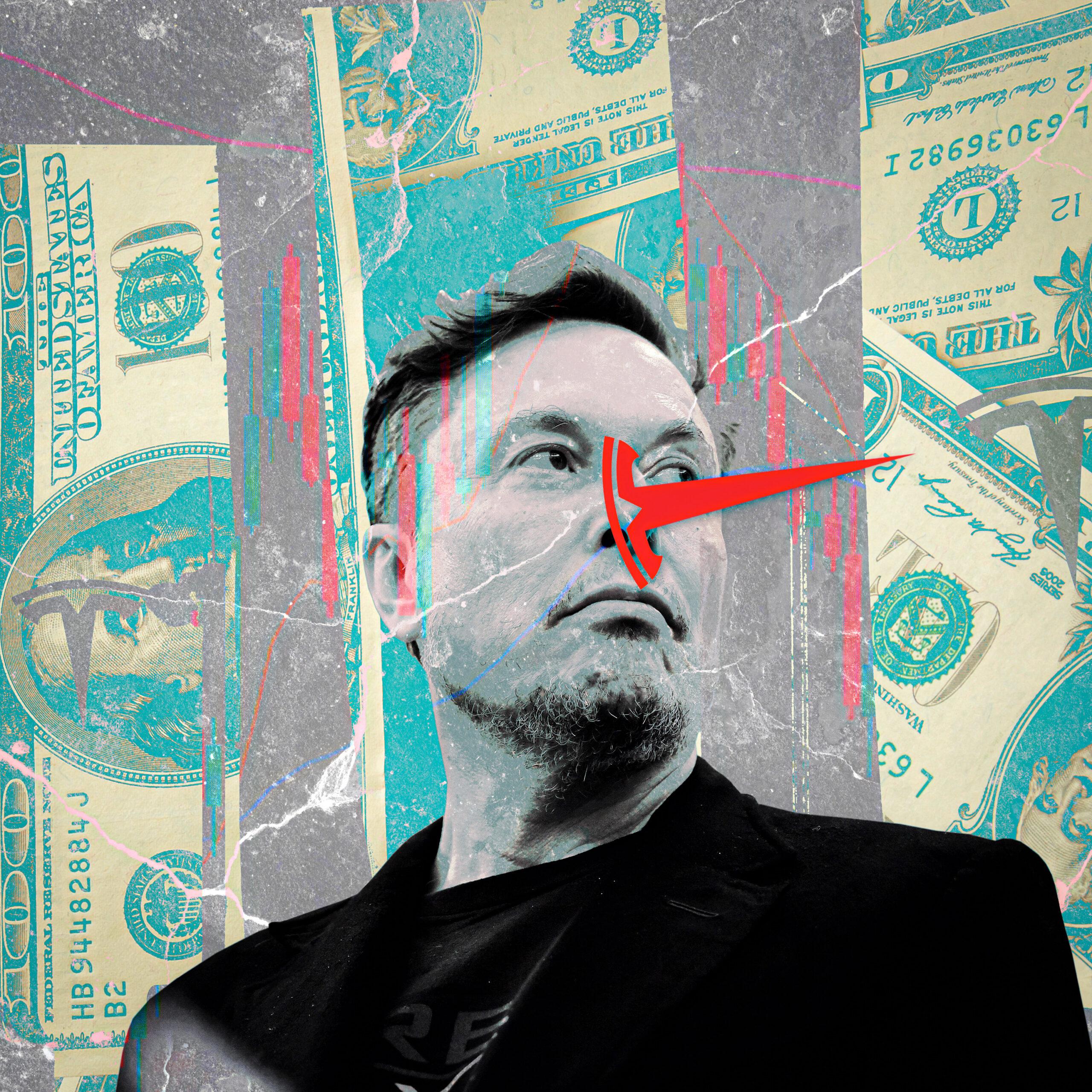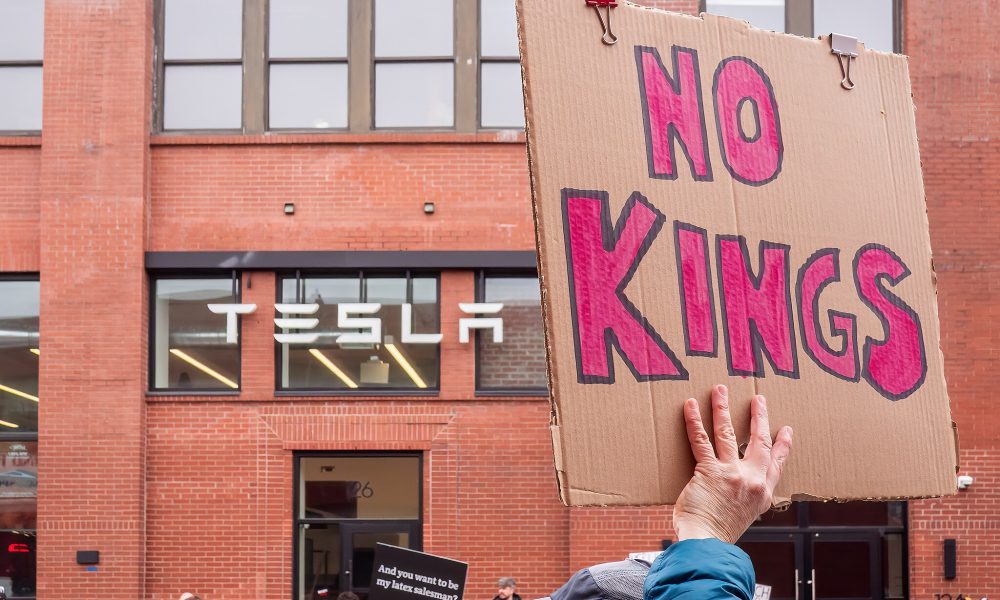
No, Elon Musk is not getting a trillion dollars from Tesla. It’s not happening. Not a real thing. I’m sorry. I know you’ve seen a lot of news suggesting his new pay package is worth that much, or might be worth that much, or could end up being worth that much under conditions that might one day materialize. This news is wrong. It’s not a lie, exactly, but it’s clinging to honesty by its fingernails. The pay package was structured in such a way as to give us a gaudy, but basically fake, top-line number to gawk at. And ever since the deal was approved by Tesla shareholders on Thursday, the media has been unable to resist the temptation to do unpaid PR work for Musk and Tesla by waving that theoretical number—one! trillion! dollars!—in our faces, even though it has about as much chance of coming true as Musk has of developing a healthy relationship with another human being.
Let’s run through this. Elon Musk is the CEO of Tesla—not the founder, though he likes to pretend that he is—and was given this new pay deal after the last one the board offered him was repeatedly rejected by the courts. The new deal is massively incentive based. Under it, he receives no salary. Instead, he gets allocations of Tesla stock when the company hits certain targets. This type of deal resembles a bonus structure in sports contracts, and if you follow sports, you understand that some incentive targets are attainable, and some incentive targets are not. Rush for 1,000 yards when you reached 900 in the previous NFL season? Attainable. Rush for 20,000 yards in one season? Not. No athlete would ever accept a benchmark that high, but to get anywhere near the trillion-dollar payout you’ve been hearing about, Musk would have to hit targets even more unlikely—targets that are ludicrous in themselves but also designed in a way that perfectly spotlights Musk’s specific weaknesses and those of the corporate culture he’s built at Tesla. We’ll talk more about the targets in a second, but first, let’s talk about those weaknesses.
Musk is not—I’ll put this as politely as I can, since I disagree with his stance that empathy is for the weak—a finisher. From his proposed hyperloop concept to his plans for space exploration to his promise to reinvent the American government, he consistently overpromises and consistently under-delivers. His robo-taxi service would, he said, have a million autonomous cabs on the road by 2020; as of 2025, there are fewer than 200. He promised to sell millions of Cybertrucks, at a rate of 250,000 per year; as of this fall, he’d sold fewer than 70,000. His failed predictions about self-driving Teslas are so numerous that they have their own Wikipedia page. (He predicted fully autonomous Teslas would come in two years or less in 2015, 2016, 2017, 2018, 2019, 2020, 2021, 2022, 2023, 2024, and 2025, often more than once in a single year.) His Department of Government Efficiency was, he promised, going to save the federal government $2 trillion; he later revised the number to $1 trillion, and then to $150 billion. In the end, it’s not clear he accomplished anything at all, other than decimating the U.S. Agency for International Development, resulting in the needless deaths of hundreds of thousands of people.
Musk’s method has always been: make grand, unsubstantiated claims about what’s coming in the nearish future, trusting in his faithful followers to make the claims sound believable; fundraise off the excitement the claims generate; and, when the claims fail to come true, replace them with new claims. Ideally grander ones. So how feasible do those incentives in his new pay package look? Well, to make his trillion dollars, he’s been asked by the Tesla board to “completely transform Tesla and society as we know it.” He has to hit his prediction for a million robo-taxis. He has to sell 10 million subscriptions to Tesla’s self-driving software. He has to increase Tesla’s market value more than sixfold, to $8.5 trillion. The most valuable company in the history of the world, Nvidia, which supplies chips to the AI industry, nudged past the $5 trillion mark in October.
He would also have to build an enormous robot army. This is not me being funny. Tesla is explicitly demanding that he build and sell an army of 1 million robots. “Enormous robot army” is a term he said out loud. This army, he promises, will revolutionize the labor force and the economy and solve several of humanity’s biggest problems (as for which ones exactly, that seems to depend on the day). During Tesla’s quarterly earnings call last week, he told Wall Street investors that he needed his new compensation deal not because he wanted the money but to ensure that he controls enough Tesla stock to retain influence over the robot army after he creates it:
If I go ahead and build this enormous robot army, can I just be ousted at some point in the future? If we build this robot army, do I have at least a strong influence over this robot army? Not control, but a strong influence. … I don’t feel comfortable building that robot army unless I have a strong influence.
I also would not feel comfortable building a robot army unless I had a strong influence. I also don’t know how to build a robot army, and I assure you, neither does Elon Musk. Tesla’s current robotics operation consists of one prototype android, the Optimus, which is not available to buy. It can walk without falling over and dance a little, as long as a human being operates it via remote control. Musk has said Optimus will “create a world where there is no poverty” and that it will “be an incredible surgeon.” He says things like this because experience has taught him that people will do what he wants when he says things like this, and that he will face no consequences when the things he says fail to come true.
The point is: The colossal, world-altering tasks laid out in his new pay deal would be nearly impossible even for a CEO who specializes in seeing large projects to completion. For Musk specifically? They are hilariously outside his wheelhouse. And every news story that blurs over this obvious fact is doing publicity work for Musk by spinning yet another grand narrative depicting him as a trailblazing visionary. News organizations are willing to get dog-walked in this fashion because you will click on a headline about Musk’s trillion-dollar contract, while you will probably not click on a headline about the implications of narrative overreach in the tech sector. Narrative overreach in the tech sector, however, is real.
Don’t get me wrong here. The richest man in the world is not going broke behind this pay deal. There are targets in the package that are easier to hit, and they are worth a stupid amount of money. If Tesla’s value goes up a bit and its sales don’t totally implode, Musk stands to receive shares worth up to tens of billions. He stands to be compensated to a hideous, unjustifiable degree. He just doesn’t stand to make a trillion dollars.
During Thursday’s vote, Musk’s pay package was approved with 75 percent of the shareholder vote. Shareholders’ votes were weighted by the number of shares they owned. And since Musk, who owns about 12 percent of Tesla, was allowed to vote his own shares, his majority wasn’t quite as overwhelming as it first appeared. Still, it was big. Tesla has been slumping under his leadership for years, thanks in part to his increasingly techno-fascist personal brand. It’s likely to slump further as expiring tax credits make electric cars less desirable for consumers. So why would so many Tesla stockholders vote to keep their faltering, distractible, immature edgelord of a CEO in the job?
The answer, I think, is that there are two camps of Musk supporters in the ranks of Tesla shareholders, and they have very different motives for their support. The first camp is made up of Musk fans who’ve bought into his cult of personality. Musk’s vast fame and controversial public persona probably ensure that there are more investors of this type around Tesla than around most other companies, since those who can’t stand him are more likely to dump their stock, and those who love him are more likely to do the opposite. (There are no metrics that measure this, but I would guess Tesla has more parasocial shareholders—verified X users and MAGA devotees who’ve bought stock to feel a social connection to Musk—than any other company.)
The second group of Musk supporters is made up of people who recognize the pitfalls of his leadership but think he’s still their best hope for keeping shares up. Remember, most investors care more about the stock price of a company than whether the company works as a business, and the two things are often less connected than you’d think. Tesla is a midsize car company in terms of sales, but in terms of market capitalization, a measure of the total value of its stock, it’s not only the most valuable car company on the planet; it’s more valuable than all of its top rivals combined. In other words, it’s wildly overvalued, but it’s propped up by investors willing to bet on Musk’s expansive claims about the future as well as his political ties to the Trump administration. Fire him as CEO, and, yes, you might have a chance to build a stronger business, but in the interim, Wall Street is left looking at a highly unromantic picture: a middlingly successful auto company with major structural challenges ahead and no carnival barker to promise infinite money next year.
Tesla’s stock price, in this view, is like a balloon: It falls when deprived of hot air. And for Tesla shareholders who hold this view, it’s possible to doubt Musk’s ability to deliver on his promises and still see those promises as your best chance of getting paid, because you know someone will believe them.
I wrote last week that we are living in the “storytelling economy“: a market dominated by companies peddling an epic vision of our sci-fi destiny, companies using bold narratives about the future to cover up their business weaknesses in the present. Musk, maybe even more than Sam Altman, is the storytelling economy’s chief exponent. It seems to me that his new pay package is less a blueprint to build a functional company than a license for him to indulge in all his worst instincts. He gets paid by driving share prices up? OK, he’ll use all his tricks to keep the market detached from reality: make bigger promises, tell more lies. He gets paid by flooding the streets with self-driving taxis? Fine, he’ll tune the X algorithm to throw support to politicians who will approve them for road use, whether or not they’re ready. He gets paid by constructing a robot army? Cool, I hope whatever government agency gets stuck with this army after Musk donates $30 million to the Trump library likes half-finished, semi-functional robots. And it still won’t be enough.
This all seems like an extremely high price for Tesla shareholders to pay just to be led by a pitchman whose pledges seldom come true. But then, maybe what Musk offers them is something more comfortingly familiar. I assume many Tesla shareholders own Teslas themselves. They must be used to riding in a vehicle piloted by an overhyped intelligence that’s not optimized for the real world.
Brian Phillips
Brian Phillips is the New York Times bestselling author of ‘Impossible Owls’ and the host of the podcasts ‘Truthless’ and ‘22 Goals.’ A former staff writer for Grantland and senior writer for MTV News, he has written for The New Yorker and The New York Times Magazine, among others.Source link



